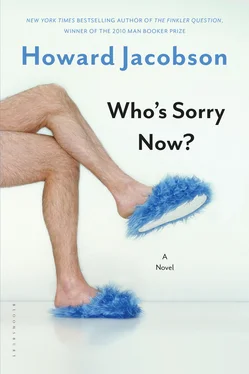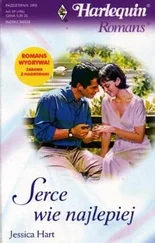Enter Kreitman, spouting determined views. Later on, they both decided, he must have smelt fatherlessness on her, given how wide he opened his paternal arms — Come to Marvin! — and also given how much space he tried to take up in her company, filling all her needs; but at the time of his first wooing her she made him think more of the forest than the orphanage. There was some quality of feral shyness about her that fascinated him; she seemed to peer at him from behind trees, startled, wanting to snuffle him before she would come out. Even her face was snouty, pointed like a deer’s, with piercing grey forestial eyes, suggesting indolence no less than timidity, and maybe not timidity at all so much as cruel reserve. In her dressing she chose to give the impression of floaty impermanence, tying her cascading lion’s mane in ribbons too insubstantial to contain it, and favouring flighty dresses in filmy colours over the wintry denims most girls wore for lectures.
One warm spring day she turned up for lunch in the union twirling a damson-coloured parasol. And matching damson-coloured ribbons in her hair. When Marvin saw that he thought his chest would burst with love. A parasol!
‘You remind me,’ he told her on their third curry date, ‘of a tropical butterfly.’
‘Oh, please!’ she said.
‘I’m not spinning you a line. I feel that as long as I keep my palm open and absolutely still you will stay on it’ — he demonstrated his meaning with a hand as steady as he could manage — ‘but as soon as I try to close around you’ — snap! — ‘you will fly away.’
Maybe that was the moment, she told herself much later, when I should have fucked him off. She tried a second time. She wrote to him after their first essay at lovemaking, suggesting that they leave it, that they weren’t suited, that whatever he may have thought he was making with her, it wasn’t love.
‘What was it, then?’ he phoned to ask.
She took her time. ‘Moan,’ she said, at last. ‘You made moan.’
He took his time too. He was upset. And genuinely bewildered. In the end the best he could come up with was, ‘I thought you were meant to moan.’
‘Not like that. Not like a soul in torment. Where was the joy?’
Joy! He didn’t ask what the fuck joy had to do with it. But he did say that for his part he thought it had gone rather well.
‘Exactly,’ she said. ‘Like a social occasion. Like a difficulty negotiated. You laboured over me, Marvin. You sorted me out.’
‘Nerves. Just give me another chance. I know where everything is now. Next time I won’t moan or labour. Next time you can labour over me.’
Too much trouble to resist. She accepted his invitation to visit his mother when his father was away selling purses at a two-day bank-holiday fair. There was an upright piano at the Kreitmans’, dark and heavy and over-ornamental, like all their furniture. Kreitman’s father hated music but believed any house he lived in should have a piano. Mona Kreitman was able to play a few tunes on it, all of them of a sort to arouse confused longings in her son. ‘Jealousy’, ‘I Wonder Who’s Kissing Her Now’, ‘You Always Hurt the One You Love’, ‘Who’s Sorry Now?’ — songs like those. At first she waved away the suggestion when he asked her to play for his new girlfriend. She couldn’t. She had no aptitude. Whatever noise she made on the piano was not meant to be heard outside the family. Finally she played and sang ‘I’ll Never Smile Again’ in an arrangement by the Ink Spots, then closed the piano lid and went to boil the kettle.
Hazel felt unliked and tried to make a better impression by sitting at the piano herself.
‘Oh, you play, do you?’ Mona Kreitman enquired, rattling the cups.
‘Not really,’ Hazel said. She essayed the first movement of a late Beethoven sonata, taking care not to essay it too well, then sang ‘Drink To Me Only With Thine Eyes’ in a voice more thrillingly purple than Kreitman had any idea she possessed.
Had Kreitman not been in love with her before, he would certainly have lost his reason over her now. A woman with a tawny mass of startled hair, who twirled a damson-coloured parasol and sang Ben Jonson! He saw his life extending through its middle years and into old age, serene and comfortable, the French windows open to a fragrant garden blessed by butterflies, wine the colour of Hazel’s hair on a silver tray beside him, and Hazel herself, his wife, untouched by time, playing the piano for him, Schubert, Chopin, Debussy.
Mona Kreitman, a psychic in the matter of her son’s heart, closed hers to Hazel. ‘You should hear Marvin sing,’ she said. ‘He has a lovely voice.’
That was the moment, Hazel told herself much later, when she should have fucked Kreitman’s mother off too. With me you will hide your light under a bushel, Mona Kreitman had as good as told her. And Hazel, the fool she was, agreed. Whatever you wish, Mrs Kreitman. Whatever will make you and Marvin happy. And so she had hidden and shrunk herself. And did it make Mrs Kreitman happy? Not on the surface, it didn’t. On the surface Mona Kreitman gave the impression of a mother who couldn’t understand what her son saw in a woman who had so little to offer, who shrank from conversation and seemed to wilt in company. ‘She’s such a mouse of a thing,’ she told her friends. But then being able to say that is a species of happiness for a mother, isn’t it?
As for whether it made Marvin happy — of course it didn’t. But then what did make Marvin happy?
In the end she got the hang of his way of doing it. Labour, sorrow, pain, talk — ‘Tell me, tell me’ — excruciation, vehemence, violence even — each of them out there spinning in a separate universe, striving, at best, for collision. Not uninteresting once you gave away the girlish dream of reciprocated romance. And she was programmed not to hang on too tenaciously to anything if it got in the way, even though in this specific instance her programmer advised her otherwise, not liking Kreitman’s bolshiness or his antecedents, and of course considering Yossi, who still occasionally sent postcards of the Negev, the dishier option.
So no, not uninteresting, sometimes very interesting indeed, for she too had a place of pain for Kreitman to labour to locate — who doesn’t? — a loneliness to graze, buttons of uncertainty and dread to press; and besides, it was all atoned for, Hazel thought, by Kreitman’s lovingness away from the lovemaking that wasn’t. He showered her with his time, she who had grown up without male company; he went shopping with her, took her to the pictures, cooked for her, expatiated in her ear, discoursed on the evils of money, showed her how dirty money made you, and when they had to be separated, let it be only for a weekend, only for a day, he wept over her. She had never seen a man weep so copiously. She had never seen a man weep full stop, but even had she, she was certain he would not have wept as Marvin wept. Off to the country to see an old school friend one Friday at the end of their second month together, she kissed him on the platform at Paddington and was shocked by how desperately he clung to her, how sorrowful he looked, how haggard and hollowed suddenly, a shadow of his usual brash self, hiding his grief-deformed face from her, unable to speak, his heart spilling from his throat. He didn’t run after the train, as she’d seen some men do, but waved her off with a hopeless hand, like a little boy’s, and blew her gentle kisses, and stood as though he meant to remain in that very place until her train pulled in again on Sunday night.
If that wasn’t what you called being in love, what was? Away from the brutalised bed, he loved her for herself, loved her to distraction, bought her presents — mainly lingerie, high heels and sex toys, but still presents — made exorbitant declarations, couldn’t bear to be without her, and surprised her again and again by the delicacy of his feelings for her, whatever the sex toys seemed to say to the contrary. Once, when he came upon her laughing with a bunch of male students at the union bar, exchanging embarrassing lavatory experiences, fart jokes, turd jokes, overflowing-cistern jokes, then clapping a monologue, her hands full of rings he’d given her, the monologue a droll explanation of why dogs lick one another’s arseholes (because originally they’d gone to a dogs’ convention and left their own arseholes outside on hangers — so it’s Platonic, you see, each dog forever searching for his own lost self), he pulled her away by her hair then dissolved into tears. He couldn’t bear to see her defiled like this, ensnared in coarseness, compromised by smut. And laughing at what wasn’t laughable. ‘Dogs’ arseholes aren’t funny, Hazel!’ Promise him, promise him, never again. He loved her to distraction, and her gratitude for all those unexpected proofs of his distraction felt very much like distracted love in return.
Читать дальше












